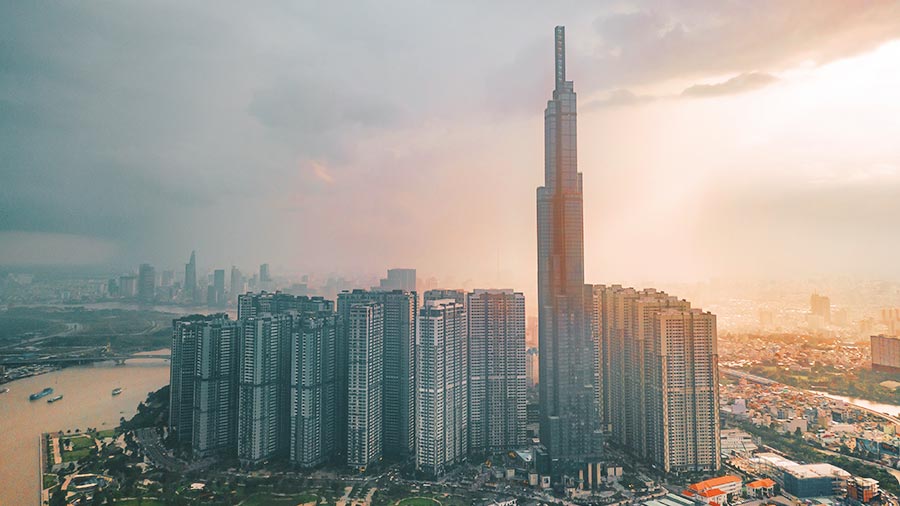Investing in Vietnam’s Dong Thap Province: 3 Key Drivers
- Significant improvements in Dong Thap province’s investment climate particularly in regulatory transparency, investor engagement, and service delivery have bolstered Dong Thap’s attractiveness for investors.
- The local government’s on-going policy focus includes a strategy to move agricultural production towards value-added production, which necessitates technology-intensive production, adoption of global production standards, and promoting trade and investment.
- Dong Thap’s investment attractiveness is also nested within the economic growth of the wider Mekong Delta region. In recent years, an increasing number of regional firms have targeted the region in sectors such as agro-processing, marine exports, renewable energy, and tourism.
Vietnam’s Dong Thap province’s improving business-friendly environment supported by strong economic growth, good governance, well laid out infrastructure, and clear policies have made it a magnet for businesses and investors.
In 2020, Dong Thap’s regional GDP grew to US$ 3.7 billion with annual average GDP growth of 6.4 percent over the past five years. Per-capita GDP averaged US$2,370 over the same period. The minimum wage in the province is VND3,040,000 (US$131) per month, which is relatively lower compared to other regions in the country.
However, given the rising demand in the labor market evidenced by increased investment and production, the minimum wage is likely to increase in the medium term. However, for 2021 given the economic impact of COVID-19, the National Wage Commission has decided not to increase the minimum wage.
The province also shares a border with Cambodia and is expected to host border trade infrastructure development projects from 2020-2022. These projects are part of an MoU signed by the Vietnamese and Cambodian governments in August 2020 aimed at increasing bilateral trade.
Ranking high in the PCI
Dong Thap achieved the highest score in the Mekong Delta region and ranked second in Vietnam as per the Provincial Competitive Index (PCI) 2020 report for the fifth time. Since 2014, the province has consistently ranked in the top three. Located in the Mekong Delta region this Southern province has emerged as a rising hub for investment, production, and growth.
Vietnam Briefing examines three key drivers that make Dong Thap an attractive destination for investors. Nevertheless, business entities must do their due diligence and look at Dong Thap’s strengths and weaknesses and tailor their business requirements if investing in the province.
Dong Thap’s agri-business transformation
The agricultural sector has historically been the economic structure on which Dong Thap’s prosperity rests. The province has over 30,000 hectares of fruit production with a rising proportion of these farms reaching VietGAP standards. VietGAP or Vietnam Good Agricultural Practices are a set of product quality standards that certify the application of certain production methods capable of producing export-quality, clean, and safe products.
Mango and other citrus fruits are also key outputs from the region.
Floriculture is concentrated around the province’s Sa Dec city. Recent data suggests that floriculture production rose 9.5 percent last year to reach US$64 million. The Mekong Delta, in which the province is based is also a major rice production hub in the country. Dong Thap is Vietnam’s third-largest rice-producing province with production accounting for 5.6 percent of national output.
In recent years, policymakers have attempted to steer the agricultural economy of the province towards sustainable, commodity-based production models. The shift in production methodology is aimed at decreasing production costs, increasing technology adoption in agriculture, and significantly improving production efficiency, crop yield, and product quality. Under this strategy, farmers are also being directed towards adopting global standards of production such as VietGAP and GlobalGAP for fruit production.
Foreign investment is a key element of Dong Thap’s agricultural transformation. In order to aid technology adoption, access to technology, and global markets is vital. Agriculture currently hosts 14 of a total of 22 FDI projects in the region. These projects are collectively valued at US$172 million in committed capital. Firms from the US, Australia, Japan, Singapore, Thailand, and China are key players in commodity-based, tech-intensive agricultural production.
Ease of doing business and regulatory environment
Dong Thap’s consistently high ranking in the PCI reflects improvements in the policy and investment climate of the province. It has further cemented its position as an evolving and progressive province among investors and those looking for business opportunities.
Comparative PCI data for 2018 and 2019 shows that in 2019, Dong Thap’s investment climate displayed signs of higher transparency, increased efficiency in business support services, lower informal charges, and low levels of policy bias. The province also came second again in the national Provincial Governance and Public Administration (PAPI), which reflects improvements in administrative procedures and lower local transaction costs for businesses.
According to Nguyen Van Duong, the chairman of Dong Thap People’s Committee, local management agencies have been steered towards engaging with businesses to resolve challenges, lower time costs in business compliance procedures, and significantly improve service delivery.
Local authorities have used the ‘business-coffee’ model which entails implementing government support packages, dealing with labor issues, and holding direct meetings with businesses to listen to their problems.
Local government officials have also been implementing the ‘four stops on one working day’ model, which is aimed at streamlining business setup and registration processes in the province.
Currently, the average time for business set-up and registration is 1.27 days. Some government engagements and programs are specifically targeted at startups. In 2019, 525 new startup ventures were registered in the province with a total registered capital of US$149 million.
Opportunities in the Mekong Delta Region
Being in the Mekong Delta, Dong Thap benefits from several opportunities introduced by the government and resulting foreign investment. In recent years, the Mekong Delta has emerged as a rising investment destination most notably for Asian investors from Malaysia, South Korea, and Taiwan. In 2019, the region attracted 1,707 foreign direct investment projects with total registered capital amounting to US$23 billion. As of April 2021, Dong Thap is home to 4,244 operating businesses and has granted investment licenses to 195 projects with a total registered capital approximating VND20 trillion (US$869.57 million)
In addition, Dong Thap is building the Tan Kieu Industrial Park (IP) in Thap Muoi district as well as completing necessary procedures to establish Ba Sao and Tran Quoc Toan IPs in Cao Lanh district; this will facilitate the implementation of new investment projects.
In order to attract FDI, the government has focused on improving logistics efficiency through infrastructure investments. For instance, earlier this year, the government approved a US$2 billion infrastructure investment plan for the Mekong Delta region, aimed at improving intra-provincial connectivity through coastal road networks. A key project included in the plan is an expressway network that connects Ca Mau, Bac Lieu, and Can Tho provinces by 2025.
Numerous foreign firms have participated in infrastructure growth in sectors such as transport, construction, and energy. For instance, Singapore-based Delta Offshore Energy’s 3200 megawatt LNG power plant is set to be the largest FDI project in the Mekong Delta by 2027. At the Vietnam Energy Summit 2020, policymakers signaled a focus on the Politburo’s Resolution No.55-NQ/TW which prioritizes renewable energy infrastructure investment through private sector engagement.
In addition, the region hosts an expanding consumer base; 17.2 million people with 8.4 percent annual growth in monthly per-capita income. This makes it conducive for investments in consumer-facing services such as retail, healthcare, tourism, and education.
Note: This article was first published in December 2020, and has been updated to include the latest developments.
About Us
Vietnam Briefing is produced by Dezan Shira & Associates. The firm assists foreign investors throughout Asia from offices across the world, including in Hanoi, Ho Chi Minh City, and Da Nang. Readers may write to vietnam@dezshira.com for more support on doing business in Vietnam.
We also maintain offices or have alliance partners assisting foreign investors in Indonesia, India, Singapore, The Philippines, Malaysia, Thailand, Italy, Germany, and the United States, in addition to practices in Bangladesh and Russia.
- Previous Article Vietnam Issues Preferential Tariffs, Rules of Origin Guidelines for UKVFTA
- Next Article Q&A: Wie sich Vietnams Lieferketten von denen anderer Länder unterscheiden und wie es an globalen Wertschöpfungsketten teilnimmt


































